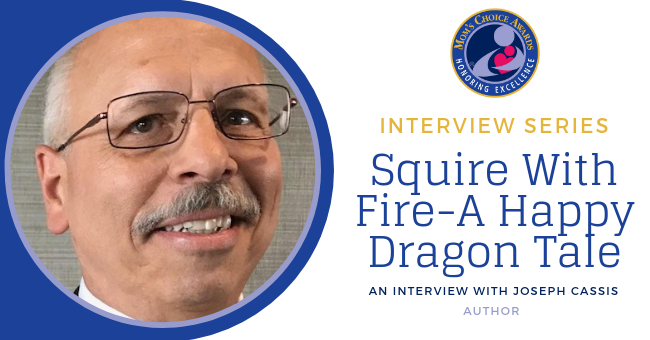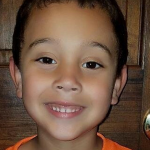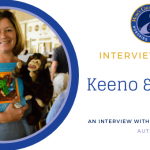Mom’s Choice Awards is excited to announce another post in our interview series where we chat with the inventors, designers, publishers, and others behind some of our favorite family-friendly products.
A big hello to our wonderful readers! As a part of our ongoing interview series, we at Mom’s Choice had the privilege of talking with Joseph Cassis, author of the Award-Winning book Squire With Fire- A Happy Dragon Tale. We have a hero (or heroine!), bravery, hard work, and s’mores, all wrapped up in a heartfelt and meaningful book. As you’ll read below, Joseph was inspired by his daughter’s burgeoning interest in dragon tales from a young age, and vowed to write her a story of his own. This dream was finally realized just before his daughter gave birth to her own daughter, Isla. Through deep focus, self-exploration, and a winding road, Squire With Fire was born. If you are looking for something to read with your children that is sure to instill a deep sense of self, especially in our young girls, this is it. Keep reading for the full interview!
MCA: Hi Joseph! Thanks for taking some time to hang out with us and answer some questions. We’re excited to have you and Squire With Fire in the Mom’s Choice family! Can you start by telling our readers about yourself?
Joseph: I am fortunate to live a life of many stories, too numerous to tell in this interview. I was born in Charleston, West Virginia to loving parents. My father was a chemist and my mom was a nurse. When my parents told me that we would be moving to Stamford, Connecticut, I was devastated knowing I would lose my friends. At 10 years old, I was often bullied because of my Southern accent, causing me to become introverted and overweight.
I would entertain myself by drawing cars, aircraft and various concepts, hoping they would become new inventions. While alone or waiting for a family event to conclude, I would tell myself stories in my head, based on people I either liked or had great disdain for. There were no smartphones or tablets for entertainment. I tried to incorporate some points in my stories that helped me understand why a situation occurred. This required me to observe people and question my existence. The process was great therapy.
High school changed me since I could not hide from the many aspects of life. Though I was overweight, I forced myself to get lean and earn a spot on the football team…primarily to prove to myself and family I could apply my mind and body to overcome any challenge. I made mostly ‘As’ and joined a couple of community-minded clubs where I became active in many social events, especially where entertainment was involved.
I was accepted in a few out-of-state universities but went to the University of Connecticut (UCONN). My father made the decision for me by saying if I wanted to attend a university, the first-year tuition was all that I would receive. I acquired the rest of the tuition by being a chef at a country club on the beach; a great opportunity to learn to manage as well as observe a different sector of society.
I thought I wanted to be an astronaut or an aircraft engineer, so I entered into the College of Engineering pursuing an aeronautical engineering degree. After almost flunking out during my first semester, due to lack of interest and probably the continuation of too much partying, I changed my major. I chose Psychology to better understand people and myself. Unfortunately, my studies led me to believe I had every mental disorder known to the world.
Knowing that a degree in Behavioral Psychology would not be sufficient for a job without a higher level of education, I went to Washington University in St. Louis for my M.B.A., focusing on Marketing and Information Technology; the hottest two job professions at the time.
My first job was with Kraft Foods as a system analyst, eventually leading us to accept a job in Iowa as Vice President of Application Development for a start-up telecommunication company, which was my introduction into entrepreneurship. After that company was eventually acquired, I started a restaurant, which was a dream of mind coming from the days I was a chef. The entrepreneurial spirit was in my blood.
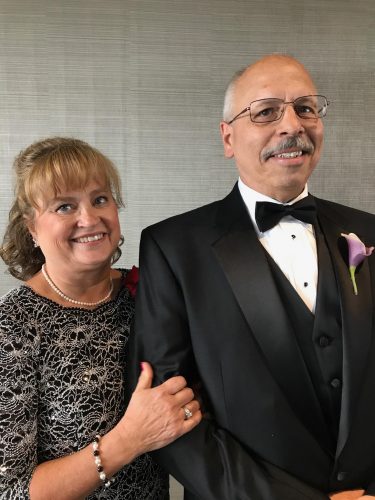
Joseph and Joyce
From there, a large chain offered a lucrative deal for my award-winning restaurant. I worked at the University of Iowa, which eventually led me to the Iowa Soybean Association, and my first introduction into agriculture. I was the Vice President of Marketing.
After the Association was hit hard by the farm crisis, I became the Deputy Director for the State of Iowa’s telecommunication department. I was required to write speeches for the Governors, Executive Directors, and statesmen/women on technical issues, educational topics, and homeland security concerns. Budget cuts required all deputy directors to be dismissed from the payroll, leading me back to agriculture, where I currently represent U.S. Manufacturers of agricultural equipment into the Chinese market, as well as provide solutions to enhance the farm production in that country. Understanding the cultural differences are critical to succeed in this venue. I have even learned to speak a little Chinese while traveling through China!
My wife, Joyce, and I love taking road trips to all parts of the country. One objective in my ‘bucket list’ was to visit or live in all 50 states, which I achieved last year by spending two weeks in Alaska and celebrating 25 years of marriage. We live with Carmella, a loving and smart Labrador/Great Pyrenees mix who puts a smile on my face every day. Our daughter, Mallory, now lives in Cedar Rapids with her husband, daughter and a dog name Romeo.
MCA: Wow! What a story. It’s always interesting to hear how an author’s life path leads them to the place they came to when they wrote their first book. It sounds like you had a bit of a winding road throughout life. Was there ever a specific hardship that had a profound effect on you?
Joseph: The earliest one that revealed how vulnerable one can be related to influences outside your control occurred while I was pursuing my M.B.A. degree at Washington University. I was notified one week before graduation that I was short of the 3.0 GPA-requirement for graduation. I was told I had a 2.8 GPA. Two years of hard work and large loans would be lost with no alternatives but to take the necessary courses being offered the following year.
I had rented my cap and gown. My parents had already purchased airplane tickets to attend the graduation. I would be humiliated, especially knowing that my father graduated summa cum laude from his university and achieved the highest GPA ever scored for his university; held that distinction to that day. In addition, my job offer was pending once I graduated. The apartment in Chicago was already rented. Even my aunt who provided me with room and board, had spent weeks planning a surprise party. This would be devastating to my ego, my financial well-being and embarrassing to my parents and family members. Besides, I had no funds for additional courses.
I spoke to all my professors who sympathized with me but stated they had no control over the situation. The grades were submitted. However, they did meet on my behalf and offered an alternative. If I received an A+ on my programming course, I would have sufficient points to graduate. They told me it was probably an impossible undertaking to complete the assignment with a perfect score and additional credit in such a short amount of time. I would only have 4 days to complete the assignment since the administrator needed 1 day to go back and add me to the graduation list. The graduation was that Saturday. The programs had already been printed with my name in it, even more humiliation.
I pulled all-nighters for four days working in the computer lab. I could not understand how this shortage could be possible especially since I monitored my GPA so closely. I finally had the courage to go to the Dean’s office to verify my grades and determine which course that I do so poorly. As the administrator showed me how she calculated my GPA, it became apparent she miscalculated the credits. A selective course in the Engineering School was being counted as 3 credits since it was outside of the Business School and not the authorized 4 credits which required me to have the Dean sign off. I had a 3.2 GPA without the A+! All my effort and stress were not necessary, but it taught me to have tenacity and never accept what is perceived to be true without verification. I benefited from that lesson many times over the years.
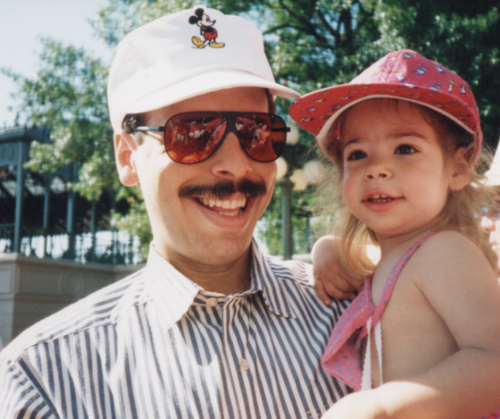
Joseph and Mallory
MCA: That is an incredible story- I can only imagine the immense stress you felt during those four days. It’s really neat, though, that you can see where that struggle led you to understand an invaluable lesson that you’ve carried with you for the rest of your life.
Can you tell us what inspired you to write Squire With Fire- A Happy Dragon Tale?
Joseph: My daughter, Mallory, loved Mickey Mouse when she was 2. My parents had retired to Florida so while we were visiting them, we took a trip to Disney World where Mallory was introduced to knights and dragons. She loved them. As we were sitting on the steps of the Cinderella Castle, I promised her I would write her a book about knights and dragons. She loved to read, but life flew by and I hadn’t written her story. I would tell bedtime stories about knights and dragons, but no book. Then, after thirty years, she told us that we would be grandparents. I had a second chance to leave her a legacy. So, I sat down one weekend and wrote the story, keeping it a secret from Mallory.
I then contacted several illustrators and found out to my surprise that since I envisioned having over 20 illustrations, the cost to have them done by a professional would be over $5,000. I could not afford such an investment. I began taking online courses to learn the drawing techniques, but it was so slow, and I hoped to have the book ready by the time Isla would be born in April last year, or at least by Mother’s Day.
I did succeed in completing the illustrations by teaching myself how to use a digital board and software instead of pencil and paper. However, I had no idea the amount of time the publisher would need for editing, design layout iterations, proofing and finally the printing process. It was finally released in November. I presented the book in a gift box to Mallory before Christmas. When she opened it up, tears of joy came streaming down her face. That was my reward, which was priceless to me. My mission, my dream, and her dream were completed and now can be shared with her daughter. What a thrill it was to know after all those years, Mallory still remembered her wish to have a book about knights and dragons.
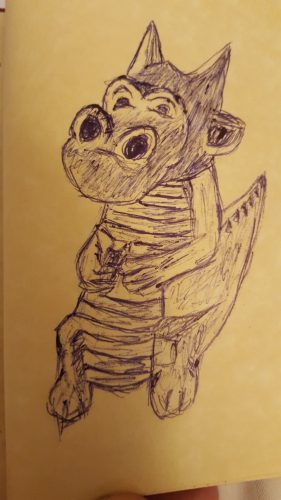
One of Joseph’s earliest sketches of a dragon
MCA: You mentioned that you taught yourself how to illustrate. How difficult was this learning process? The book itself is beautifully done!
Joseph: Like many people, I doodle but not to the level of illustrating in a book. I first started out by purchasing colored pencils and special drawing paper and a couple of online courses. I had some drawing back in Engineering but that was inanimate objects. I used Photoshop to learn about enhancing photos and layering. All of this helped me bring back some techniques regarding spacing and dimensional drawing, but again, not to the degree necessary for the book. In fact, my first dragon looked like a monkey. The online course helped me to do shadowing for human figures like the first eye I drew, then, I applied those techniques to drawing a knight on a horse. Surprisingly, it looked pretty good.
So, I moved to doing illustrations for the book but it took way too long. Then I remembered about digital boards and layering. This was an exponential leap. I have included a recent illustration that I just completed for my upcoming book. So, to be learning something new gives one a huge sense of accomplishment, the joy in learning and then, probably the most important aspect, being able to share that creativity with others…what a priceless feeling.
MCA: So your book is not only a meaningful work of art and accomplishment for you, it’s a legacy for Mallory and Isla. We can think of no better reason for writing a book. You’ve talked about values and morals being central in your work. Can you tell us more about how you’ve incorporated these into Squire With Fire?
Joseph: There are many stories that tell about great adventures and journeys or about a character’s challenges, but they don’t emphasize specific issues that are difficult to address because of the possible embarrassment or awkwardness. I tried to weave in some of those issues by portraying them through the squire and the dragon characters.
I purposely chose a squire because of the similarities in the ages of when children were chosen to begin their squire journey and today’s 7-12-year-old readers pursuing their desires. Squires were chosen to begin their quest for knighthood at seven years old. They worked toward that goal for another 14 years and if they make it through all the tasks, education and work, the squires would become highly respected citizens within the community and gain wealth and prominence. Showing this venue, gives the reader an understanding that great things can be achieved with the right work ethic.
Knights were known to demonstrate chivalry which is the combination of qualities expected of an ideal knight, especially courage, honor, courtesy, justice, and a readiness to help the weak. In addition, knights were known to respect all citizens, especially women. However, the story stressed how women were in prominent positions whether it was the queen or a teacher as well as moms and women police officers.
The reason I titled the book Squire With Fire was to emphasize passion or having the fire to pursue one’s dreams. At the same time, the play on the word ‘fire’ as in Spitfire, the name of the dragon which Squire Mackenzie persuaded to help the castle instead of trying to destroy it or having to fight the dragon.
MCA: Excellent! So, speaking of sensitive subjects, you tackle issues such as gender equality, bullying, and suicide, which is no small task.
Joseph: Having a daughter and seeing so many reports of sexual harassment, abductions, glass ceiling situations, human trafficking and other negative effects over the years toward girls and women, I thought I would incorporate an early warning system on these issues. I wanted to have a platform for the parents, grandparents and even young readers to ask questions that pertain to these issues. For instance, Mac, the grandchild who is asking about a special ring, even stated about being called ‘big lips’ and how much that bother her. This would possibly open a ‘door’ for readers to correlate with a similar situation and discuss with whoever is reading the book with them. The name or bullying phrase was an actual one I personally had to endure growing up. (Later, I found out that many women would prefer such succulent lips for kissing!)
The same thoughts ran through my head about young children committing suicide. Why, how? Is it because society has become less family-oriented and more dependent upon the Internet for our entertainment, information and bonding times? Are parents avoiding this discussion because they don’t know how to approach the subject without seeming to be preachy or lecture. So, I thought it would be appropriate to talk about how suicide was perceived in older times and compare it with today’s perspective as well as why there are these differences. If those feelings do crop up or the child knows of a friend that has talked about ending his/her life, then the child may not feel awkward discussing the issue with the parents/grandparents or the teachers.
I purposely avoided any reference to the gender of the grandchild so that by the end of the story, most readers would assume that the young grandchild is a boy and the squire is also a boy, and to their surprise, they are girls. Hopefully, that prejudicial thought shakes up the reader to realize how they too, were concluding the wrong gender. Immersing themselves into the story with that thought wakes them to a new perspective on profiling individuals.
Writing a story to avoid all pronouns and any reference to the gender was extremely difficult to do. Several edits consistently revealed that a phrase or a word was missed, and the mind did not even catch it, either by pro editors or by me who was striving to avoid such reference. I just gave away the twist in the book. However, even if the reader knows this story element exists in the book, it’s a challenge for the reader to try to see if there is a clue that indicates the gender.
MCA: And you even have historical elements in the book, as well as ancestry?
Joseph: I wanted to highlight the importance of family and the history of the family. Knowing the lineage brings into perspective how traditions and culture plays a role on certain historic events influencing the way people interact with each other. Acquiring the knowledge of family builds bonds with its heritage and provides a platform for more discussion of its linage whether it’s the immediate family members or those back in history.
These revelations hopefully will generate interest for young children to wonder about their ancestry and ask more questions about their family members. In addition to the family, the children learn about the geography, where they originated and how they were living in those days versus their current way of life.
I did research to bring into the story actual events and places so the children can ‘google’ real historic facts to heighten their awareness and learn about places where they might not even know exist or people who lived in that period of time. This reinforces the credibility of the story and differentiates the fiction portion of the story with actual elements. The grandfather then acts as the guide into the past, and the special ring as the conduit to the past.
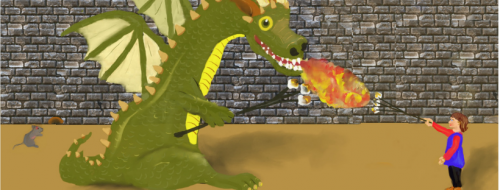
Mac and Spitfire roasting s’mores!
During this glimpse of the history, humor is introduced so the story is entertaining but also illustrates how people think of the past compared to their current surroundings. An example is when Squire Mackenzie and Spitfire have s’mores. It’s funny to think that a dragon would use its fiery breath to cook s’mores, something that young children can relate to and see the humor of such a situation.
MCA: That is simply adorable- we loved the s’mores part, too! So, if you could ensure your audience walked away with one piece of knowledge or understanding after reading Squire With Fire, what would it be?
Joseph: Be a life-long learner with passion in order to dispel preconceived notions about people and our existence on this planet. By working hard with much enthusiasm to acquire that knowledge and wisdom, huge feats of creativity can be achieved while solving problems that others may not even have a clue to unravel. There are so many cultures in this world that have unique perspectives on life, none are right or wrong within their lives. Only those who judge it. Communication is key to understanding. Literacy is one of the tools to provide that communication. Everyone has a great story to tell. Enjoy your imagination!
MCA: Joseph, thank you so much for spending this time with us, it was truly a pleasure to hear your stories, your process, and more about your amazing book, Squire With Fire- A Happy Dragon Tale! We look forward to everything you have yet to do in the future.
Joseph Cassis hopes to take his book, Squire With Fire, on a road show to schools, libraries, and book stores in order to emphasize the importance of literacy and to share the elements of his story. A sequel is in the works, hopefully to be released in November at the Johnston Public Library. To keep up with Joseph’s writing and Squire With Fire, check out his website!


